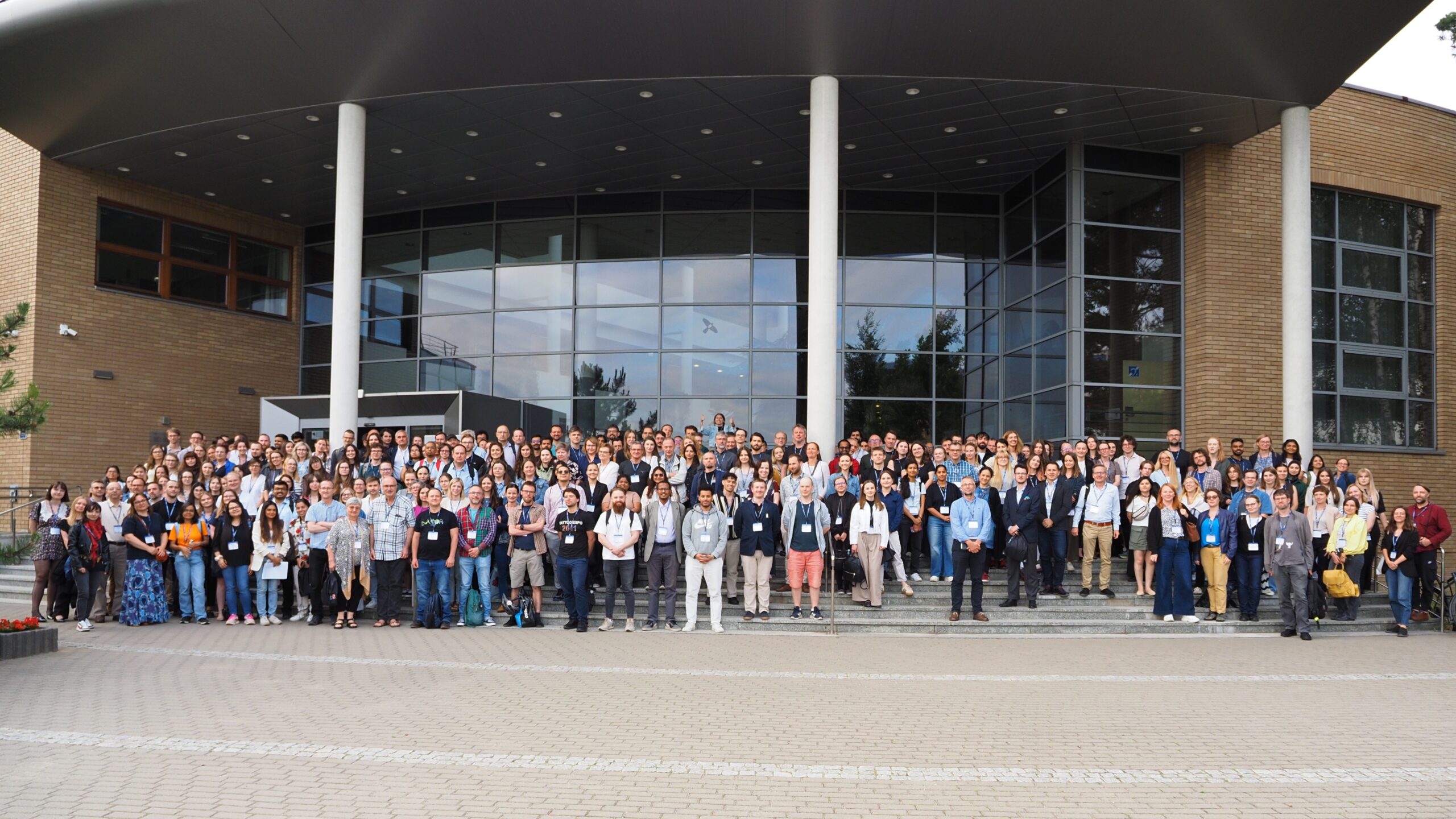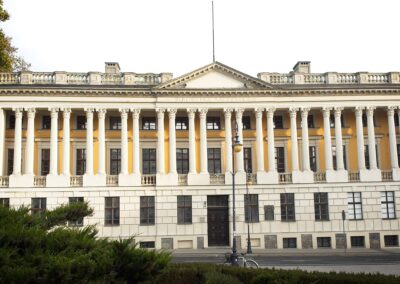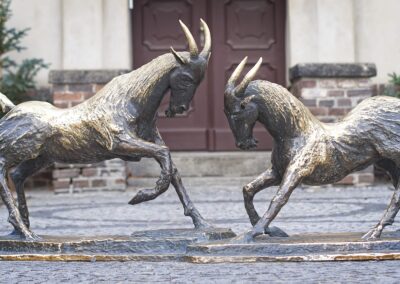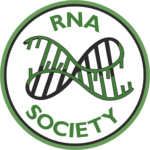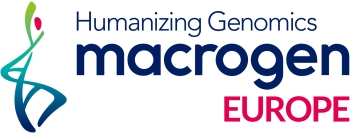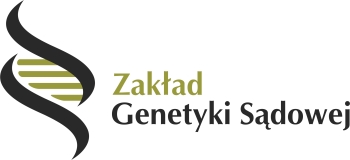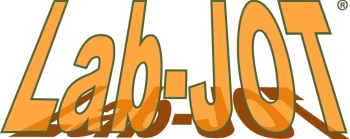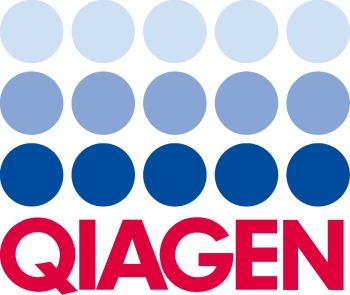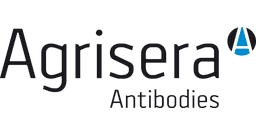2nd Polish RNA Biology Meeting
Adam Mickiewicz University in Poznań
Collegium Biologicum
About the meeting
The 2nd Polish RNA Biology Meeting, which will be hosted in Poznań in 2025, follows after the very successful Polish RNA Biology Meeting that was organized in 2023 in Warsaw. We hope that in this way we start a new international conference series, which will become a regular, bi-annual event to share new ideas among RNA scientists. Our meeting will start on Tuesday, June 24, at 17:00 (registration will be opened at 15.00), and will be finished on Friday, June 27, at 13:00.
Poznań has been a major center of RNA research in Poland since the 1960s. At the beginning RNA studies in Poznań focused on tRNA structure and function, and on the chemical synthesis of ribonucleic acids. Currently, many research groups work on a range of topics related to RNA properties. RNA biology is also a major subject of studies in several other cities in Poland, while numerous Polish researchers have contributed to RNA research abroad or established their laboratories in other countries. We are convinced that the meeting will serve as a platform to stimulate new collaborations, inspire the use of advanced technologies, and encourage the participants to initiate new and challenging research directions.
Welcome to the RNA world! We promise friendly scientific atmosphere, open discussions, outstanding keynote talks of our invited guests and an opportunity to present you research results in talks or during never-ending poster sessions.
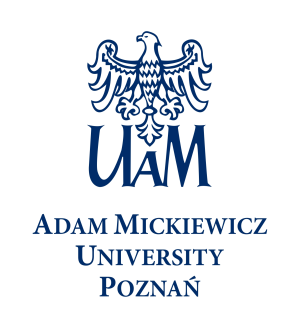
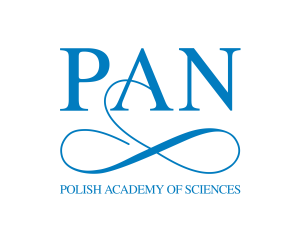
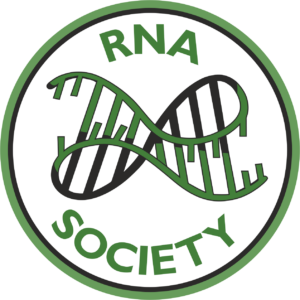
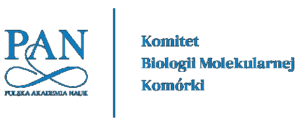

About the meeting
The 2nd Polish RNA Biology Meeting, which will be hosted in Poznań in 2025, follows after the very successful Polish RNA Biology Meeting that was organized in 2023 in Warsaw. We hope that in this way we start a new international conference series, which will become a constant, bi-annual event to share new ideas among RNA scientists. Our meeting will start on Tuesday, June 24, at 17:00 (registration will be opened at 15.00), and will be finished on Friday, June 27, at 13:00.
Poznań is a major center of RNA research in Poland since the 1960s. At the beginning the RNA studies in Poznań focused on tRNA structure and function, and on the chemical synthesis of ribonucleic acids. Currently, many research groups work on a range of topics related to RNA properties. The RNA biology is also a major subject of studies in several other cities in Poland, while numerous Polish researchers have contributed to RNA research abroad or established their laboratories in other countries. We are convinced that the meeting will serve as a platform to stimulate new collaborations, inspire the use of advanced technologies, and encourage the participants to initiate new and challenging research directions.
Welcome to the RNA world! We promise friendly scientific atmosphere, open discussions, outstanding keynote talks of our invited guests and an opportunity to present you research results in talks or during never-ending poster sessions.





Keynote talks
- Elena Conti
(Max Planck Institute of Biochemistry, Martinsried, Germany) - Andrzej Dziembowski
(International Institute of Molecular and Cell Biology, Warsaw, Poland) - Dominique Gagliardi
(University of Strasbourg, France ) - Sebastian Glatt
(Malopolska Centre of Biotechnology, Kraków, Poland) - Kai Papenfort
(Institute of Microbiology, Friedrich Schiller University of Jena, Jena, Germany) - Ramesh Pillai
(Department of Molecular and Cellular Biology, University of Geneva, Switzerland) - Bertrand Séraphin
(Institute of Genetics and Molecular and Cellular Biology, Illkirch, France)
Conference topics
- RNA structure and folding
- pre-mRNA processing
- mRNA turnover
- regulatory RNAs
- RNA surveillance and degradation
- RNA modification, translation
- RNA localization and transport
- RNA-protein interactions and RNP assembly
- RNA-chromatin interactions
- viral RNAs
- transcriptomics and bioinformatics
- RNA and disease
- RNA-based therapies
Keynote talks
- Elena Conti
(Max Planck Institute of Biochemistry, Martinsried, Germany) - Andrzej Dziembowski
(International Institute of Molecular and Cell Biology, Warsaw, Poland) - Dominique Gagliardi
(University of Strasbourg, France ) - Sebastian Glatt
(Malopolska Centre of Biotechnology, Kraków, Poland) - Kai Papenfort
(Institute of Microbiology, Friedrich Schiller University of Jena, Jena, Germany) - Ramesh Pillai
(Department of Molecular and Cellular Biology, University of Geneva, Switzerland) - Bertrand Séraphin
(Institute of Genetics and Molecular and Cellular Biology, Illkirch, France)
Conference topics
- RNA structure and folding
- pre-mRNA processing
- mRNA turnover
- regulatory RNAs
- RNA surveillance and degradation
- RNA modification, translation
- RNA localization and transport
- RNA-protein interactions and RNP assembly
- RNA-chromatin interactions
- viral RNAs
- transcriptomics and bioinformatics
- RNA and disease
- RNA-based therapies
Registration and abstract submission
The cost of participation in our meeting is PLN 600 for regular participants, and PLN 450 for students and PhD students. The fee covers: participation in all lecture and poster sessions, lunches and dinners, coffee breaks, snacks and drinks served during poster sessions.
Registration will last until May 31. Payments will be available by bank transfer or credit card.
Abstracts that authors would like to have considered for oral presentations must be submitted by April 6. Abstracts of poster presentations can be submitted till May 31. The abstract book will be available online for all meeting guests and participants (no paper book will be printed). Registration is obligatory for abstract acceptance.
Poster board size is 980 mm × 1220 mm. Please prepare your posters vertically in the size of A0.
![]() During the meeting, Internet access will be available only through the eduroam network, using accounts from your institution.
During the meeting, Internet access will be available only through the eduroam network, using accounts from your institution.
In case of questions contact us at 2ndrna@amu.edu.pl
Registration and abstract submission
The cost of participation in our meeting is PLN 600 for regular participants, and PLN 450 for students and PhD students. The fee covers: participation in all lecture and poster sessions, lunches and dinners, coffee breaks, snacks and drinks served during poster sessions.
Registration will last until May 31. Payments will be available by bank transfer or credit card.
Abstracts that authors would like to have considered for oral presentations must be submitted by April 6. Abstracts of poster presentations can be submitted till May 31. The abstract book will be available online for all meeting guests and participants (no paper book will be printed). Registration is obligatory for abstract acceptance.
Poster board size is 980 mm × 1220 mm. Please prepare your posters vertically in the size of A0.
![]() During the meeting, Internet access will be available only through the eduroam network, using accounts from your institution.
During the meeting, Internet access will be available only through the eduroam network, using accounts from your institution.
In case of questions contact us at 2ndrna@amu.edu.pl
Program
Day 1 – Tuesday, June 24
15:00 - 17:00
Registration
17:00 - 17:15
Opening
17:15 – 18:00
Keynote Lecture
Chair: Krzysztof Sobczak, Adam Mickiewicz University, Poznań, Poland
Ramesh Pillai, Department of Molecular Biology, University of Geneva, Switzerland
RNA modifications in control of mammalian gene expression
18:00 – 18:45
Keynote Lecture
Chair: Gracjan Michlewski, International Institute of Molecular and Cell Biology in Warsaw, Poland
Sebastian Glatt, Małopolska Center of Biotechnology, Kraków, Poland
tRNAslational control of eukaryotic gene expression
19:00 - 🙂
Get together party
Day 2 – Wednesday, June 25
8:00 - 9:00
Registration
09:00 - 9:45
Keynote Lecture
Chair: Kinga Kamieniarz-Gdula, Adam Mickiewicz University, Poznań, Poland
Andrzej Dziembowski, International Institute of Molecular and Cell Biology in Warsaw, Poland
Complex metabolic pathways of endogenous and therapeutic mRNAs in vivo
9:45 - 10:15
Coffee break
10:15 - 12:00
Session on RNA and Disease
Chair: Magdalena Dziembowska
Krzysztof Sobczak, Adam Mickiewicz University, Poznań, Poland
The role of structural elements within mutant mRNA of FMR1 gene containing expanded CGG repeats on the regulation of non-canonical translation of toxic polyglycine protein
Maria Borja Gonzalez, University of Galway, Ireland
miR-199 regulates neuromuscular homeostasis during ageing
Boris Rogelj, Jožef Stefan Institute, Ljubljana, Slovenia
C9orf72 mutation alters membrane protein expression in ALS and FTD
Tomasz Kuliński, International Institute of Molecular and Cell Biology in Warsaw, Poland
Nuclear RNA decay gone wrong: how DIS3 mutations drive and then escape multiple myeloma
Gracjan Michlewski, International Institute of Molecular and Cell Biology in Warsaw, Poland
5′ terminal nucleotide determines the immunogenicity of IVT RNAs
Sandra Fienko, University College London, London, UK
Molecular characterisation of RNA-rich ensembles in Huntington’s disease
Agnieszka Fiszer, Institute of Bioorganic Chemistry PAS, Poznań, Poland
HTT loss-of-function contributes to RNA deregulation in developing Huntington’s disease neurons
Paweł Sikorski, University of Warsaw, Poland
Effective recognition of double-stranded RNA does not require activation of cellular inflammation
12:00 - 13:00
Lunch
13:00 - 13:45
Keynote Lecture
Chair: Mikołaj Olejniczak, Adam Mickiewicz University, Poznań, Poland
Kai Papenfort, Friedrich Schiller University of Jena, Germany
From strings of nucleotides to collective behavior: Lessons from Vibrio cholerae and its phages
13:45 – 14:15
Coffee break
14:15 -16:00
Session on Regulatory RNA
Chair: Szymon Świeżewski, Institute of Biochemistry and Biophysics PAS, Warsaw, Poland
Oleg Dmytrenko, Helmholtz Institute for RNA-based Infection Research, Würzburg, Germany
RNA-triggered Cas12a3 cleaves tRNA tails to execute bacterial immunity
Paulina Jackowiak, Institute of Bioorganic Chemistry PAS, Poznań, Poland
Knockdown of Smed ELAC2 in Schmidtea mediterranea decreases 5′ tiRNA-Gly-GCC levels and reveals its regulatory role in regeneration
Monika Jóźwiak, Adam Mickiewicz University, Poznań, Poland
The DEAD-box helicases DRH1, RH46 and RH40 remodel the secondary structure of miRNA precursors to regulate miRNA biogenesis in plants
Halina Pietrykowska, Adam Mickiewicz University, Poznań, Poland
Tiny but mighty: Male-specific MpmiR11889 regulates proper sperm cell development and sexual reproduction efficiency in Marchantia polymorpha
Zbigniew Warkocki, Institute of Bioorganic Chemistry PAS, Poznań, Poland
Cytoplasmic synthesis of LINE-1 complementary ssDNA via self-primed reverse transcription
Marta Sztachera, Institute of Bioorganic Chemistry PAS, Poznań, Poland
Catch me if you can: Unveiling circRNA functions through capturing RNA-protein interactions
Robert Pasieka, Adam Mickiewicz University, Poznań, Poland
Exploring the interactions between lnc-ARRDC4-1, lnc-ADCYAP1-2, and DHX36: A novel axis in the translational and cellular pathways control
Jacek Nowak, Institute of Biochemistry and Biophysics PAS, Warsaw, Poland
Discovery of the role of the PIWI-interacting protein Gtsf1 in the selective degradation of small RNAs in Paramecium
16:00 – 16:30
Coffee break
16:30 - 18:15
Session on RNA Modification
Chair: Tomasz Turowski, Institute of Biochemistry and Biophysics PAS, Warsaw, Poland
Monika Gaik, Małopolska Center of Biotechnology, Kraków, Poland
Deciphering Human Dihydrouridine Synthases: Structural Insights and Therapeutic Potential
Marta Zimna, Adam Mickiewicz University, Poznań, Poland
Pseudouridine – a new layer in plant microRNA biology
Dawid Bielewicz, Adam Mickiewicz University, Poznań, Poland
Unbiased identification of novel non-YTH putative m6A readers from Arabidopsis thaliana
Haider Ali, Małopolska Center of Biotechnology, Kraków, Poland
The m6A modification of HIV-1 RNA is linked with a ribonucleoprotein MATR3-ELAVL1 complex
Katarzyna Goljanek-Whysall, University of Galway, Galway, Ireland
Oxidised microRNAs – novel mechanism of muscle wasting?
Elena Zemlyanskaya, Institute of Experimental Botany CAS, Prague, Czech Republic
RNA modification t6A in plant development
Piotr Gawroński, Warsaw University of Life Sciences, Warsaw, Poland
tRNA Sequencing Reveals a Blend of Ancestral and Acquired Post-Transcriptional Modifications in Chloroplast tRNAs
Barbara Nawrot, Centre of Molecular and Macromolecular Studies PAS, Łódź, Poland
Sulfur- and selenium-modified uridines in the epitranscriptome of tRNA
18:15 – 19:30
Dinner
19:30 – 22:00
Poster Session I – wine, beer, and snacks
Posters with odd numbers will be presented and discussed
Day 3 – Thursday, June 26
8:00 - 9:00
Registration
09:00 - 9:45
Keynote Lecture
Chair: Andrzej Dziembowski, International Institute of Molecular and Cell Biology in Warsaw, Poland
Bertrand Seraphin, Institute of Genetics, Molecular and Cellular Biology, Illkirch, France
Eukaryotic CCR4-NOT complexes: 1001 ways of regulating mRNA deadenylation and decay
9:45 - 10:15
Coffee break
10:15 - 12:00
Session on Translation
Chair: Barbara Nawrot, Centre of Molecular and Macromolecular Studies PAS, Łódź, Poland
Haaris Safdari, University of Hamburg, Germany
The translation inhibitors kasugamycin, edeine and GE81112 target distinct steps during 30S initiation complex formation
Ivan Sorokin, University of Groningen, Netherlands
Near-native mammalian cell-free protein synthesis system enabling mRNA translation in polysomes
Khushboo Sharma, Charles University, Prague, Czech Republic
Deciphering Translational Regulation During the Cell Cycle Using Scarce Sample Polysome Profiling and Flow Cytometry
Joanna Kufel, University of Warsaw, Poland
Non-canonical translation events in the yeast Saccharomyces cerevisiae
Marek Tchórzewski, Maria Curie-Skłodowska University, Lublin, Poland
Ribosomal P-stalk: a harbinger-harmonizer of ribosome-factor interactions
Vladyslava Liudkovska, IMol PAS, Warsaw, Poland
Translational Tuning of Sf1 Shapes the Splicing Landscape and Stem Cell Function
Katarzyna Knop, Cancer Research UK – Scotland Institute, Glasgow, UK
Role of the RNA cap methylation in T-cell activation and differentiation
Witold Szaflarski, Poznan University of Medical Sciences, Poznań, Poland
Mitoxantrone targets the nascent polypeptide exit tunnel to block translation, triggering the accumulation of 80S ribosome–rich stress granules
12:00 - 13:00
Lunch
13:00 - 13:45
Keynote Lecture
Chair: Sebastian Glatt, Małopolska Center of Biotechnology, Kraków
Elena Conti, Max Planck Institute of Biochemistry, Martinsried, Germany
To degrade or not to degrade: molecular mechanisms of RNA homeostasis
13:45 – 14:15
Coffee break
14:15 -16:00
Session on RNA Structure and Viral RNAs
Chair: Elżbieta Kierzek, Institute of Bioorganic Chemistry PAS, Poznań, Poland
Lukáš Pekárek, Dresden University of Technology, Dresden, Germany
RNAs untangled: Shedding light onto complex structures of long RNAs
Palina Kot, Justus Liebig University Giessen, Germany
Structural and Functional Insights into the Sub2-Yra1-Tho1 Complex in Nuclear mRNP Biogenesis
Mateusz Wilamowski, Jagiellonian University, Kraków, Poland
Structural Insights into N4BP1 as an RNase within the mRNA Decapping Machinery
Angelika Andrzejewska-Romanowska, Institute of Bioorganic Chemistry PAS, Poznań, Poland
Mapping the structural landscape of the RNA genome of the active Ty3 retrotransposon
Jakub Nowak, Malopolska Centre of Biotechnology, Kraków, Poland
DyRNA Thermometry allows to monitor position specific structural changes in folded RNA
Tomasz Turowski, Institute of Biochemistry and Biophysics PAS, Warsaw, Poland
Rate limiting steps in RNA synthesis during early SARS-CoV-2 infection
Ivan Trus, International Institute of Molecular and Cell Biology in Warsaw, Poland
Unveiling Real-Time Innate Immune Responses with a Novel Fluorescent IFN-β Reporter Mouse
Martin Pospíšek, Charles University, Prague, Czech Republic
Discovery of uncapped and 5’-polyadenylated mRNAs in poxviruses and yeast virus-like elements – comparison and similarities of both models
16:00 – 16:30
Coffee break
16:30 - 18:15
Session on Computational RNA Biology
Chair: Marek Tchórzewski, Maria Curie-Skłodowska University, Lublin, Poland
Marcin Sajek, University of Colorado School of Medicine, Aurora, CO, USA
aa-tRNA-seq – nanopore based method for sequencing intact aminoacylated tRNAs
Martyna Nowacka, Molecure SA, Warsaw, Poland
MoleRNA – discovering and designing small molecules targeting mRNA
Yaarob Altalli, Adam Mickiewicz University, Poznań, Poland
Epigenetic control of transcriptional landscape during keratinocyte differentiation
Michał Krzysztoń, Institute of Biochemistry and Biophysics PAS, Warsaw, Poland
Transcriptional activity during seed imbibition is conserved, robust and required for germination
Monika Kwiatkowska, Institute of Bioorganic Chemistry PAS, Poznań, Poland
From Unknown to Unveiled: Revealing the Hidden Landscape of Zebrafish lncRNAs with CapTrap-CLS
Marcin Tabaka, Institute of Physical Chemistry PAS, Warsaw, Poland
Inference of developmental processes and gene expression programs from single-cell multimodal data
Natalia Ryczek, Adam Mickiewicz University, Poznań, Poland
Role of ELAVL1 in RNA:RNA duplex-mediated expression regulation of head-to-head overlapping protein-coding genes INO80E and HIRIP3
Luiza Zuvanov, Free University of Berlin, Germany
FAM32A-mediated 3’-splice site selection controls germline and embryo development in C. elegans.
18:15 – 19:30
Dinner
19:30 – 22:00
Poster Session II – wine, beer, and snacks
Posters with even numbers will be presented and discussed
Day 4 – Friday, June 27
09:00 - 9:45
Keynote Lecture
Chair: Magda Konarska, IMol PAS, Warsaw, Poland
Dominique Gagliardi, University of Strasbourg, France
Processes shaping poly(A) tails in Arabidopsis
9:45 - 10:15
Coffee break
10:15 - 11:30
Session I on Transcription and mRNA Processing
Chair: Magdalena Masłoń, Małopolska Center of Biotechnology, Kraków, Poland
Michał Rażew, European Molecular Biology Laboratory, Grenoble, France
Structural basis of the Integrator complex assembly and association with transcription factors
Magda Kopczyńska, Adam Mickiewicz University, Poznań, Poland
SETD2 methyltransferase activity aids gene definition by promoting correct transcription initiation and termination
Jan Mikołajczyk, Institute of Biochemistry and Biophysics PAS, Warsaw, Poland
Comprehensive mapping of active transcription by human RNA polymerase III reveals a rate-limiting role for transcription termination
Bogdan Cichocki, IMol PAS, Warsaw, Poland
The by-product of spliceosomal first-step catalysis protonates adjacent catalytic triplex residues, promoting transition to the second step
Ankita Kumari, IMol PAS, Warsaw, Poland
Implications of spliceosome control during the malignant hematopoietic activation
Mateusz Dróżdż, Free University of Berlin, Germany
Immediate early splicing after T cell activation is controlled by temporal phosphorylation of hnRNPC2
11:30 - 12:00
Coffee break
12:00 – 13:15
Session II on Transcription and mRNA Processing
Chair: Zbigniew Warkocki, Institute of Bioorganic Chemistry PAS, Poznań, Poland
Maciej Śmiałek, University of Basel, Switzerland
CFIm-Complex-Driven Alternative Polyadenylation Controls mRNA Length, Stability, Localization and Protein output in colon and other cancers
Natalia Gumińska, International Institute of Molecular and Cell Biology in Warsaw, Poland
Tracking poly(A) tail diversity with Ninetails: mixed tails from cells to mRNA therapies
Mateusz Bajczyk, Adam Mickiewicz University, Poznań, Poland
The role of PCF11-similar proteins in alternative polyadenylation and flower development in Arabidopsis thaliana
Agnieszka Czarnocka-Cieciura, International Institute of Molecular and Cell Biology in Warsaw, Poland
Decoding mRNA Fate: Poly(A) Tail Dynamics and the Role of Puf Proteins in Deadenylation-Mediated Regulation of Gene Expression in S. cerevisiae
Veena Halale Manjunath, Institute of Biochemistry and Biophysics PAS, Warsaw, Poland
Hidden Message – Nuclear mRNA storage in seeds
13:30 - 13:45
Closing remarks
Venue
Venue
Collegium Biologicum
ul. Uniwersytetu Poznańskiego 6
61-614 Poznań
Poland
Accommodation
We recommend finding and booking accommodation on booking.com (https://www.booking.com).
To find the best way from the hotel to the meeting venue (Collegium Biologicum, Adam Mickiewicz University), please use the website https://jakdojade.pl/poznan.
Below is a list of hotels that are well connected to the meeting venue by public transport:
- Hotel Lemon Plaza, tel. +48 601 461 602, ul. Drużbickiego 3, 61-693 Poznań, recepcja@lemonplaza.pl, https://lemonplaza.pl
- Hotel Vivaldi Poznań, tel. +48 61 858 81 00 lub +48 530 962 445, ul. Winogrady 9, 61-663 Poznań, poznan@vivaldi.pl, https://www.vivaldi.pl/poznan/kontakt/
- HL Hotel Lechicka, tel. +48 697 900 213, ul. Lechicka 101, 61-619 Poznań, recepcja@hotel-lechicka.pl, https://www.hotel-lechicka.pl/kontakt/
- Willa Medica, tel. +48 504 241 134, al. Niepodległości 35, 61-714 Poznań, info@cuwil.pl, https://willa-medica.pl/kontakt/
- Hotel Altus Poznań Old Town, tel. +48 61 640 86 00 lub +48 570 255 888, ul. Św. Marcin 40, 61-807 Poznań, info@hotelaltus.pl, https://www.hotelaltus.pl/kontakt
- NH Poznan, tel. +48 61 6248800 lub ul. Św. Marcin 67, 61-806 Poznań, nhpoznan@nh-hotels.com, https://www.nhpoznan.pl/
- Ibis Poznan Centrum, tel. +48 61 858 70 00, , Plac Andersa 1, 61-894 Poznań, ha9u9@accor.com, https://all.accor.com/hotel/A9U9/index.pl.shtml
- Hotel Mercure Poznań Centrum, tel. +48 61 855 80 00, ul. Roosevelta 20, 60-829 Poznań, https://all.accor.com/hotel/3393/index.pl.shtml
Hotels that are close to the conference venue, but with no easy public transport:
- Ibis Poznań Północ, tel. +48 693 470 135, ul. Konwaliowa 3/Forteczna, 62-002 Suchy Las, h9834@accor.com, https://all.accor.com/hotel/9834/index.pl.shtml
- Park Rekreacyjno-Sportowy FairPlayce (with tennis courts!), tel +48 61 828 79 04 or +48 664 715 666, ul. Bożydara 10, 61-607 Poznań, recepcja@fairplayce.pl, http://www.hotelfairplayce.pl/kontakt/
Accommodation
We recommend finding and booking accommodation on booking.com (https://www.booking.com).
To find the best way from the hotel to the meeting venue (Collegium Biologicum, Adam Mickiewicz University), please use the website https://jakdojade.pl/poznan.
Below is a list of hotels that are well connected to the meeting venue by public transport:
- Hotel Lemon Plaza, tel. +48 601 461 602, ul. Drużbickiego 3, 61-693 Poznań, recepcja@lemonplaza.pl, https://lemonplaza.pl
- Hotel Vivaldi Poznań, tel. +48 61 858 81 00 lub +48 530 962 445, ul. Winogrady 9, 61-663 Poznań, poznan@vivaldi.pl, https://www.vivaldi.pl/poznan/kontakt/
- HL Hotel Lechicka, tel. +48 697 900 213, ul. Lechicka 101, 61-619 Poznań, recepcja@hotel-lechicka.pl, https://www.hotel-lechicka.pl/kontakt/
- Willa Medica, tel. +48 504 241 134, al. Niepodległości 35, 61-714 Poznań, info@cuwil.pl, https://willa-medica.pl/kontakt/
- Hotel Altus Poznań Old Town, tel. +48 61 640 86 00 lub +48 570 255 888, ul. Św. Marcin 40, 61-807 Poznań, info@hotelaltus.pl, https://www.hotelaltus.pl/kontakt
- NH Poznan, tel. +48 61 6248800 lub ul. Św. Marcin 67, 61-806 Poznań, nhpoznan@nh-hotels.com, https://www.nhpoznan.pl/
- Ibis Poznan Centrum, tel. +48 61 858 70 00, , Plac Andersa 1, 61-894 Poznań, ha9u9@accor.com, https://all.accor.com/hotel/A9U9/index.pl.shtml
- Hotel Mercure Poznań Centrum, tel. +48 61 855 80 00, ul. Roosevelta 20, 60-829 Poznań, https://all.accor.com/hotel/3393/index.pl.shtml
Hotels that are close to the conference venue, but with no easy public transport:
- Ibis Poznań Północ, tel. +48 693 470 135, ul. Konwaliowa 3/Forteczna, 62-002 Suchy Las, h9834@accor.com, https://all.accor.com/hotel/9834/index.pl.shtml
- Park Rekreacyjno-Sportowy FairPlayce (with tennis courts!), tel +48 61 828 79 04 or +48 664 715 666, ul. Bożydara 10, 61-607 Poznań, recepcja@fairplayce.pl, http://www.hotelfairplayce.pl/kontakt/
About Poznań
About Poznań
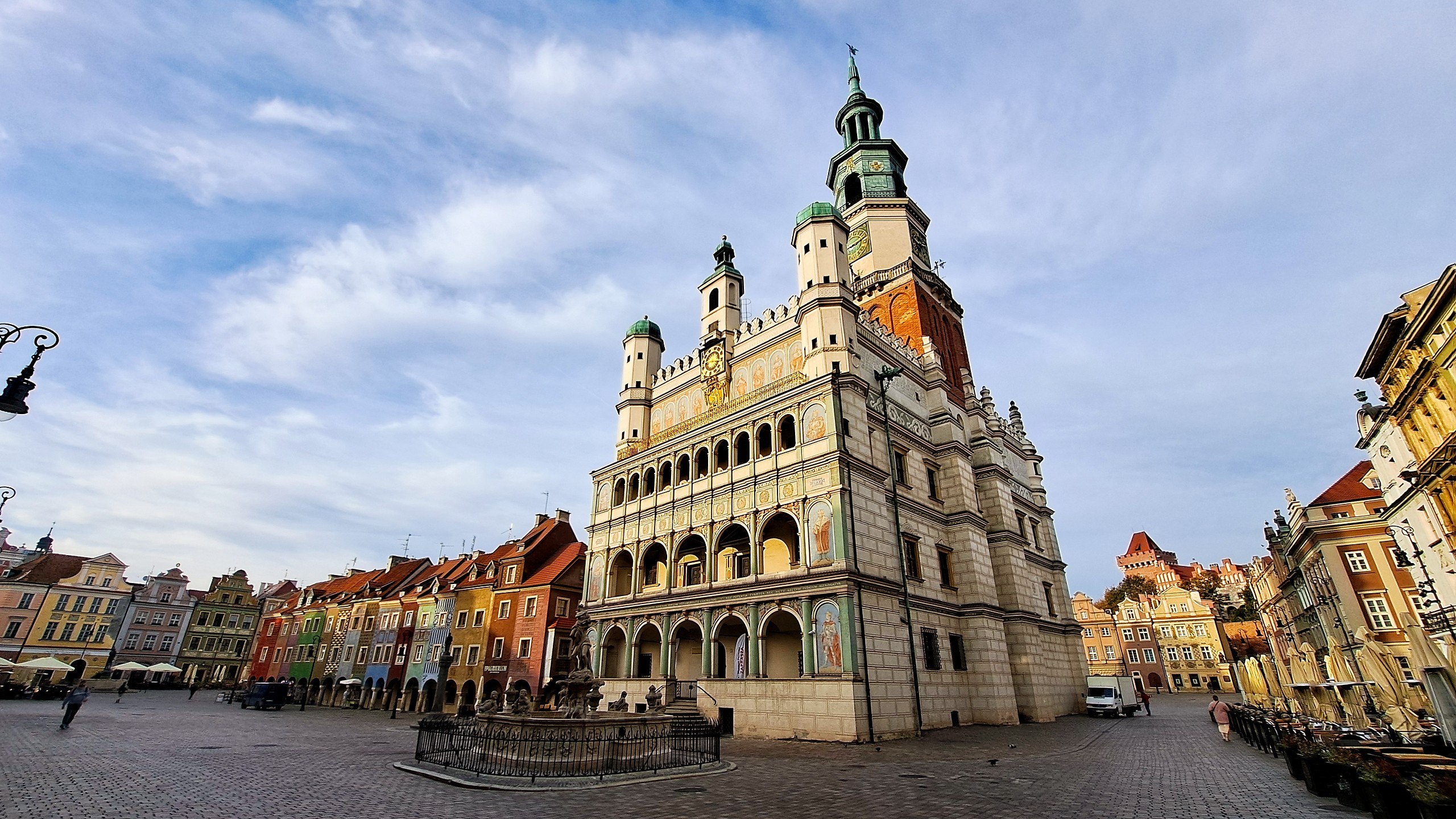
Poznań is a historic city in western Poland, which is renowned for its Renaissance-style architecture of the Old Town. The Old Market Square, with its colorful merchant houses and iconic Town Hall, is a central attraction. A popular attraction of the Poznan Town Hall are two goat figures, which are displayed at the clock tower at noon every day.
Poznań is well known for its scientific institutions. The Adam Mickiewicz University is one of the top universities in Poland. There are also several Polish Academy of Sciences institutes focused on life sciences, e.g., Institute of Bioorganic Chemistry, Institute of Human Genetics and Institute of Plant Genetics. Poznań is also a home to other universities in which biological studies are carried out, like the Poznan Medical University and University of Life Sciences.
The Poznań culinary scene is famous for St. Martin’s croissants (rogal świętomarciński), a local delicacy that you can taste during our meeting coffee breaks. This is another reason, apart from great science, to visit Poznań and take part in our June RNA meeting 😊.
Poznań blends tradition with modernity, making it an appealing destination for history, business, and education enthusiasts. This year in June it will host RNA fans!
Poznań is a historic city in western Poland, which is renowned for its Renaissance-style architecture of the Old Town. The Old Market Square, with its colorful merchant houses and iconic Town Hall, is a central attraction. A popular attraction of the Poznan Town Hall are two goat figures, which are displayed at the clock tower at noon every day.
Poznań is well known for its scientific institutions. The Adam Mickiewicz University is one of the top universities in Poland. There are also several Polish Academy of Sciences institutes focused on life sciences, e.g., Institute of Bioorganic Chemistry, Institute of Human Genetics and Institute of Plant Genetics. Poznań is also a home to other universities in which biological studies are carried out, like the Poznan Medical University and University of Life Sciences.
The Poznań culinary scene is famous for St. Martin’s croissants (rogal świętomarciński), a local delicacy that you can taste during our meeting coffee breaks. This is another reason, apart from great science, to visit Poznań and take part in our June RNA meeting 😊.
Poznań blends tradition with modernity, making it an appealing destination for history, business, and education enthusiasts. This year in June it will host RNA fans!
Committees
Scientific Committee
- Magdalena Boguta
(Institute of Biochemistry and Biophysics, Polish Academy of Sciences, Warsaw) - Andrzej Dziembowski
(International Institute of Molecular and Cell Biology, Warsaw) - Marek Figlerowicz
(Institute of Bioorganic Chemistry, Polish Academy of Sciences, Poznań) - Sebastian Glatt
(Małopolska Centre of Biotechnology, Kraków) - Magdalena Konarska
(IMol, Warsaw) - Magdalena Masłoń
(Malopolska Centre of Biotechnology, Kraków) - Barbara Nawrot
(Centre of Molecular and Macromolecular Studies, Polish Academy of Sciences, Łódź) - Krzysztof Sobczak
(Institute of Molecular Biology and Biotechnology, Faculty of Biology, Adam Mickiewicz University, Poznań) - Marek Tchórzewski
(Faculty of Biology and Biotechnology, Maria Curie-Skłodowska University, Lublin)
Organizing Committee
- Artur Jarmołowski
(Institute of Molecular Biology and Biotechnology, Faculty of Biology, Adam Mickiewicz University, Poznań) - Gracjan Michlewski
(International Institute of Molecular and Cell Biology, Warsaw) - Mikołaj Olejniczak
(Institute of Molecular Biology and Biotechnology, Faculty of Biology, Adam Mickiewicz University, Poznań) - Zofia Szweykowska-Kulińska
(Institute of Molecular Biology and Biotechnology, Faculty of Biology, Adam Mickiewicz University, Poznań) - Zbigniew Warkocki
(Department of RNA Metabolism, Institute of Bioorganic Chemistry, Polish Academy of Sciences, Poznań)
Competition committee for the best oral presentation
- Andrzej Dziembowski (head of the commission)
- Kinga Kamieniarz-Gdula
- Magda Konarska
- Magdalena Maslon
Competition committee for the best poster
- Krzysztof Sobczak (head of the commission)
- Magdalena Boguta
- Maciej Cieśla
- Sebastian Glatt
- Michał Gdula
- Dorota Raczynska
- Marek Tchórzewski
- Zbigniew Warkocki
Rules of the competition of the RNA Salon Poznan for the best oral and poster presentations during the 2nd Polish RNA Biology Meeting
- The competition is open to the participants of the 2nd Polish RNA Biology Meeting who present an oral presentation or a poster during the 2nd Polish RNA Biology Meeting.
- The evaluation of the oral presentation or poster and the manner of its presentation will be made by a competition committee composed of invited lecturers with a doctoral degree or scientific title based on a ranking system. Young researchers will be made priority over PIs. The composition of the competition committees is provided on the website 2ndrna.web.amu.edu.pl
- People whose presentations are selected as the best or distinguished will be invited to the stage during the closing ceremony of the conference and announced as the winners of the competition. Participation in the ceremony of awarding diplomas and prizes is voluntary.
- Diplomas and prizes will be awarded during the event in cash upon a mandatory confirmation of receipt or after its conclusion (in the form of a bank transfer)
- RNA Salon Poznan is an initiative of the Poznan RNA researchers from the Faculty of Biology AMU and the Institute of Bioorganic Chemistry PAS. https://portal.ichb.pl/rna-salon-poznan-2/
Scientific Committee
- Magdalena Boguta
(Institute of Biochemistry and Biophysics, Polish Academy of Sciences, Warsaw) - Andrzej Dziembowski
(International Institute of Molecular and Cell Biology, Warsaw) - Marek Figlerowicz
(Institute of Bioorganic Chemistry, Polish Academy of Sciences, Poznań) - Sebastian Glatt
(Małopolska Centre of Biotechnology, Kraków) - Magdalena Konarska
(IMol, Warsaw) - Magdalena Masłoń
(Malopolska Centre of Biotechnology, Kraków) - Barbara Nawrot
(Centre of Molecular and Macromolecular Studies, Polish Academy of Sciences, Łódź) - Krzysztof Sobczak
(Institute of Molecular Biology and Biotechnology, Faculty of Biology, Adam Mickiewicz University, Poznań) - Marek Tchórzewski
(Faculty of Biology and Biotechnology, Maria Curie-Skłodowska University, Lublin)
Organizing Committee
- Artur Jarmołowski
(Institute of Molecular Biology and Biotechnology, Faculty of Biology, Adam Mickiewicz University, Poznań) - Gracjan Michlewski
(International Institute of Molecular and Cell Biology, Warsaw) - Mikołaj Olejniczak
(Institute of Molecular Biology and Biotechnology, Faculty of Biology, Adam Mickiewicz University, Poznań) - Zofia Szweykowska-Kulińska
(Institute of Molecular Biology and Biotechnology, Faculty of Biology, Adam Mickiewicz University, Poznań) - Zbigniew Warkocki
(Department of RNA Metabolism, Institute of Bioorganic Chemistry, Polish Academy of Sciences, Poznań)
Competition committee for the best oral presentation
- Andrzej Dziembowski (head of the commission)
- Kinga Kamieniarz-Gdula
- Magda Konarska
- Magdalena Maslon
Competition committee for the best poster
- Krzysztof Sobczak (head of the commission)
- Magdalena Boguta
- Maciej Cieśla
- Sebastian Glatt
- Michał Gdula
- Dorota Raczynska
- Marek Tchórzewski
- Zbigniew Warkocki
Rules of the competition of the RNA Salon Poznan for the best oral and poster presentations during the 2nd Polish RNA Biology Meeting
- The competition is open to the participants of the 2nd Polish RNA Biology Meeting who present an oral presentation or a poster during the 2nd Polish RNA Biology Meeting.
- The evaluation of the oral presentation or poster and the manner of its presentation will be made by a competition committee composed of invited lecturers with a doctoral degree or scientific title based on a ranking system. Young researchers will be made priority over PIs. The composition of the competition committees is provided on the website 2ndrna.web.amu.edu.pl
- People whose presentations are selected as the best or distinguished will be invited to the stage during the closing ceremony of the conference and announced as the winners of the competition. Participation in the ceremony of awarding diplomas and prizes is voluntary.
- Diplomas and prizes will be awarded during the event in cash upon a mandatory confirmation of receipt or after its conclusion (in the form of a bank transfer)
- RNA Salon Poznan is an initiative of the Poznan RNA researchers from the Faculty of Biology AMU and the Institute of Bioorganic Chemistry PAS. https://portal.ichb.pl/rna-salon-poznan-2/
Committees
2nd Polish RNA Biology Meeting
24 – 27 June 2025
Collegium Biologicum
ul. Uniwersytetu Poznańskiego 6, 61-614 Poznań, Poland
e-mail: 2ndrna@amu.edu.pl
